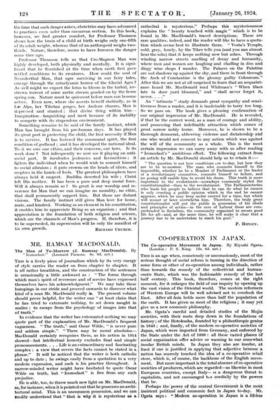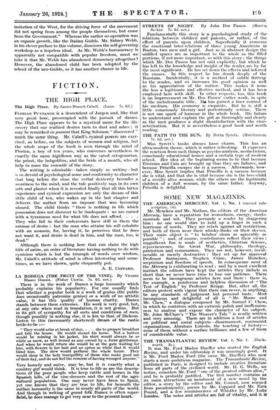CO-OPERATION IN JAPAN.
THIS is an age when, consciously or unconsciously, most of the serious thought of social reform is turning in the direction of some form or other of co-operation among individuals, rather than towards the remedy of the collectivist and bureau- cratic State, which was the fashionable remedy of the last half century. This book, therefore, comes at the right moment, for it enlarges the field of our inquiry by opening up the vast vision of the Oriental world. The modern reformers of Western Europe will be well advised not to overlook the East. After all Asia holds more than half the population of the earth. It has given us most of the religions ; it may yet give us a new economic philosophy.
Mr. Ogata's careful and detailed studies of the Mujin societies, with their roots deep down in the foundations of history ; of the Hotolcusha, founded by a philanthiopic genius in 1843 ; and, finally, of the modem co-operative societies of Japan, which were imported from Germany, and enforced by the State under the Act of 1899: all these varied phases Of social organization offer advice or warning to our somewhat insular British minds. In Japan they also are insular, at least if one is justified, in applying that adjective because 'a nation has scarcely touched the idea of a_co-operative retail store, which is, of course, the backbone of the English move. went.. But more important is the total absence of co-Qperative societies of producers, which are regarded—as likewise in most European countries, except. Italy— is a dangerous threat to capitalists, and not encouraged two cordially by the powers that be.
Perhaps the 'power of the central: GovernMent is the most insistent political and economic fact in Japan to-day. Mr.
Ogata says : Modern co-operation, in Japan is a lifeless
imitation of the West, for the driving force of the movement did not spring from among the people themselves, but came from the Government." Whereas the earlier co-operation was an organic growth, like the Italian Guilds'. Mr. Sidney Webb, in his clever preface to this volume, dismisses the self-governing workshop as a hopeless ideal. As Mr. Webb's bureaucracy is apparently not compatible with popular freedom, must we take it that Mr; Webb has abandoned democracy altogether? However, the abandoned child has been adopted by the school of the neo-Guilds, so it has another chance in life..



































 Previous page
Previous page